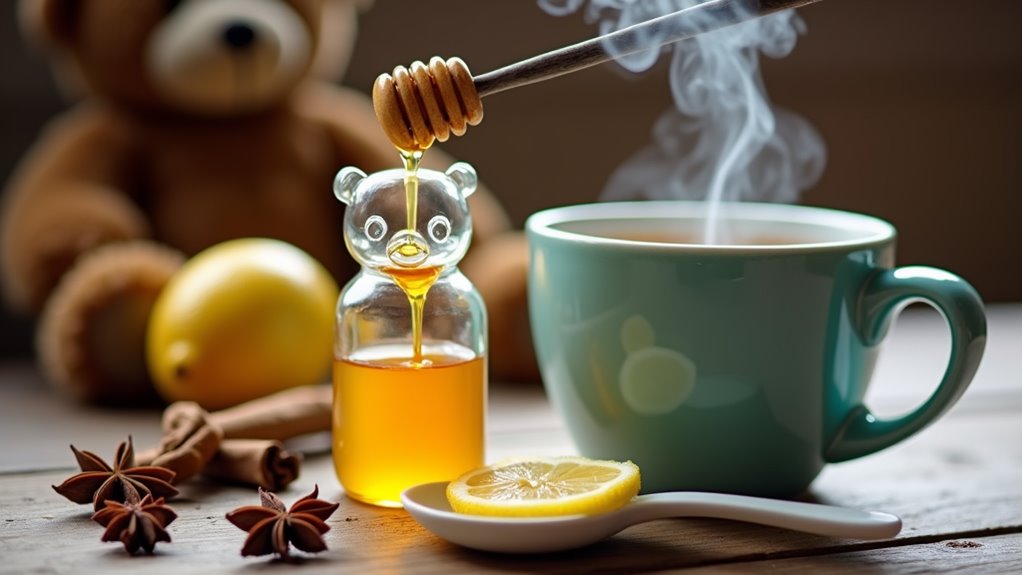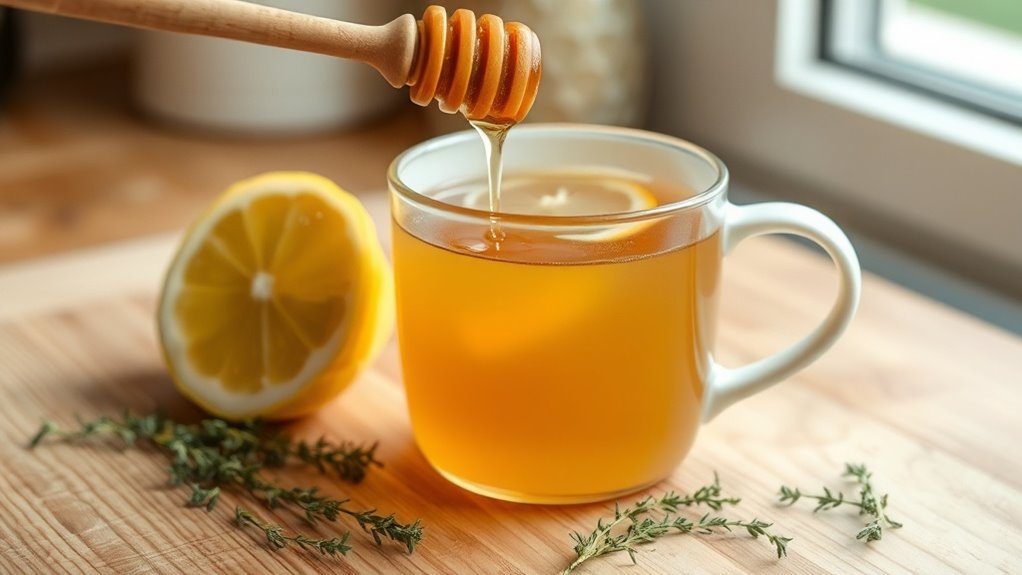Coughing Non-Stop. Here’s a Natural Trick I Always Try
When you’re struggling with a non-stop cough, try combining 2 tablespoons of raw honey with fresh ginger tea heated to a comfortable drinking temperature. This natural remedy works through multiple mechanisms – honey’s antimicrobial compounds coat and protect irritated throat tissue while ginger’s active compounds (gingerols and shogaols) target inflammation directly in your airways. You’ll typically notice relief within 15-20 minutes, and understanding the science behind this solution reveals even more powerful ways to enhance its effects.
Key Takeaways
-
Mix 2 tablespoons of honey with warm lemon water, as honey’s antimicrobial properties match dextromethorphan’s effectiveness in suppressing coughs.
-
Practice steam inhalation with chamomile or eucalyptus oil to loosen mucus and soothe inflamed airways immediately.
-
Prepare ginger-turmeric tea with black pepper to maximize anti-inflammatory benefits and reduce throat irritation.
-
Gargle with warm salt water twice daily to draw out inflammation through osmosis and eliminate bacteria.
-
Combine thyme tea with honey before bedtime to relax throat muscles and reduce nighttime coughing episodes.
My Journey With Chronic Coughing
My struggle with chronic coughing began like many others – what started as a seemingly minor irritation evolved into an eight-week ordeal that significantly impacted my daily life.
After consulting medical professionals, I learned my persistent cough stemmed from a combination of GERD and postnasal drip, two of the most common triggers. My doctor ordered several tests including chest X-rays to rule out other serious conditions. Understanding the common causes of dry cough helped me contextualize my symptoms.
The symptoms intensified at night, disrupting my sleep and leading to muscle strain around my ribcage.
While researching cough remedies for adults, I discovered the importance of identifying root causes rather than just treating symptoms.
Through diagnostic tests and a thorough medical history review, my healthcare team developed a targeted treatment approach combining lifestyle modifications and appropriate medications to address the underlying conditions.
The Science Behind Natural Cough Relief
When you experience inflammation in your airways, specialized nerve endings trigger the cough reflex as a protective mechanism against irritants and excess mucus.
Natural remedies like honey and herbal expectorants work through multiple pathways – including mucokinetic action that enhances mucus clearance and anti-inflammatory compounds that reduce airway swelling. Using a hot drink can provide more effective cough relief compared to room temperature beverages. Additionally, honey creates a protective throat coating that can help soothe irritation.
You’ll find that hydrating agents and demulcent herbs form protective barriers over irritated tissue while supporting your body’s natural healing mechanisms through improved mucociliary function and reduced oxidative stress.
Understanding Inflammation and Coughs
How does inflammation trigger the complex cascade of events leading to a cough? When you have a respiratory infection, your airways become inflamed, releasing cytokines, chemokines, and lipid mediators that activate your cough receptors. These inflammatory substances directly stimulate sensory nerve endings connected to your cough reflex.
Your immune system’s response, particularly through T lymphocytes, releases IFN-γ that activates vagal sensory neurons through JAK/STAT signaling.
This triggers calcium influx and action potentials, intensifying your urge to cough.
Vagal sensory neurons in your airway terminate in the nucleus of the solitary tract, where they process signals that generate the cough response.
Proinflammatory cytokines like TNF-α and IL-1β further stimulate these vagal nerves, increasing your airway’s sensitivity.
Even after the infection subsides, ongoing inflammation can maintain this heightened cough response through persistent neuroinflammatory signaling in your airway nerves.
Natural Healing Pathways Explained
The scientific evidence behind natural cough remedies reveals multiple therapeutic pathways that work synergistically to provide relief.
You’ll find that honey’s antimicrobial compounds and throat-coating properties suppress your cough reflex while fighting infection.
Ginger’s active compounds, gingerols and shogaols, target inflammation by inhibiting COX-2 enzymes in your airways.
When you consume hot fluids, you’re increasing mucosal blood flow and promoting mucus hydration.
Your body responds to proper hydration by thinning secretions, while expectorant botanicals like marshmallow root and thyme provide additional support.
Marshmallow root forms a protective throat layer, and thyme’s thymol delivers both spasmolytic and antimicrobial effects.
Together, these natural interventions work through distinct mechanisms to address your cough’s underlying causes.
Studies have shown that honey matches dextromethorphan in effectively suppressing coughs during upper respiratory infections.
A Simple But Powerful Remedy
Simple natural remedies can provide powerful relief for persistent coughing without relying on over-the-counter medications.
When you’re dealing with an irritating cough, a combination of trusted natural ingredients can help soothe your throat and reduce inflammation. Regular consumption of sufficient water intake helps maintain throat moisture and thin mucus for easier clearance. Additionally, ingredients like raw honey are known for their antimicrobial properties and can help soothe the throat.
- Mix one tablespoon of honey with fresh lemon juice in warm water, which helps protect mucous membranes while boosting immune function.
- Prepare thyme or ginger tea, leveraging their natural anti-inflammatory properties to relax throat muscles.
- Use steam inhalation with a few drops of chamomile oil to loosen mucus and calm irritation.
- Gargle with warm salt water solution twice daily to reduce inflammation and eliminate bacteria.
These evidence-based solutions work by targeting both the symptoms and underlying causes of your cough while supporting your body’s natural healing processes.
Why This Natural Trick Works
You’ll find that herbal remedies work through multiple mechanisms, including the anti-inflammatory effects of gingerol in ginger and the protective coating action of mucilage from marshmallow root.
The natural compounds in these herbs target specific pathways – reducing throat irritation, relaxing airways, and managing excess mucus production without the side effects common to conventional medications. Additionally, the combination of honey and ginger leverages their synergistic effect for enhanced cough relief.
These botanical solutions provide scientifically-supported relief through their active compounds, which have been shown to effectively modulate the body’s inflammatory and immune responses in clinical studies.
Science Behind Herbal Healing
Modern scientific research has revealed how natural herbal remedies effectively target coughing through multiple molecular pathways and synergistic plant compounds.
These botanical interventions work by activating specific cellular channels and modulating inflammatory responses that control cough reflexes.
-
KCNQ5 potassium channels in your blood vessels respond to compounds found in herbs like lavender and chamomile
-
Polyphenols and flavonoids directly influence your airways’ smooth muscle function
-
Multiple plant compounds work together through the “entourage effect” for enhanced therapeutic benefits
-
Traditional herb combinations optimize bioavailability through both water-soluble and lipid-soluble components
Clinical studies validate this approach, with herbs like thyme providing antimicrobial benefits through carvacrol, while Ginkgo biloba improves circulation.
You’ll find these natural solutions particularly effective because they address multiple aspects of cough symptoms simultaneously.
Quick Relief Without Drugs
While scientific research validates herbal remedies’ molecular effects, immediate relief from coughing doesn’t always require medication.
You’ll find quick relief through steam therapy, as warm moist air helps loosen mucus and soothe inflamed airways.
Combining this with honey’s natural coating properties creates a powerful duo – honey’s antimicrobial effects work alongside steam’s moisturizing benefits to reduce cough sensitivity.
Hot fluids amplify these effects by thinning mucus and stimulating saliva production.
You can enhance results by gargling with warm salt water, which draws out inflammation through osmosis.
For optimal relief, maintain proper hydration and incorporate natural anti-inflammatory agents like ginger or menthol.
These substances work together to decrease throat irritation, reduce cough reflexes, and support your body’s natural healing mechanisms.
Supporting Herbs and Ingredients
Nature offers a rich arsenal of herbs and ingredients that can effectively combat coughing symptoms.
When you’re seeking relief, combining specific herbs can create potent natural remedies that target both the cause and discomfort of your cough.
- Thyme and peppermint work synergistically – thyme soothes respiratory issues while peppermint’s menthol opens your airways.
- Marshmallow root and licorice root form a powerful duo for throat irritation, reducing inflammation and coating irritated membranes.
- Turmeric with black pepper increases curcumin absorption, maximizing anti-inflammatory benefits.
- Elderberry combined with honey accelerates recovery while soothing your throat, tapping into the benefits of immune-boosting ingredients.
You’ll find these ingredients in various forms, from teas to syrups.
For optimal results, look for products that combine multiple supportive herbs, or create your own blends using these evidence-backed ingredients.
Best Times to Try This Method
Timing plays a critical role in maximizing the effectiveness of natural cough remedies. You’ll get the most relief by using these treatments during four key periods: early morning, when cold symptoms first appear, before bedtime, and prior to physical activities.
Start your day with warm ginger tea or turmeric milk to address overnight mucus buildup.
When you notice cold symptoms developing, immediately begin taking anti-inflammatory beverages and herbal teas containing thyme or peppermint.
Before bed, use honey and warm herbal teas to reduce nighttime coughing and promote better sleep.
If you’re planning to exercise or speak for extended periods, take preventative measures by consuming warm drinks or using herbal lozenges to minimize throat irritation and cough reflexes. Additionally, using natural remedies such as honey as a natural cough suppressant can provide swift relief from irritation.
Combining With Other Natural Solutions
To maximize the effectiveness of natural cough remedies, combining multiple therapeutic approaches can create synergistic benefits.
Research shows that certain herb combinations work particularly well together, while lifestyle modifications can enhance their impact.
- Mix thyme with ivy leaf extract for enhanced bronchial support – studies indicate this combination is especially effective for bronchitis symptoms.
- Blend honey into ginger-turmeric tea to create a powerful anti-inflammatory and soothing drink.
- Combine steam inhalation using eucalyptus oil with slippery elm or marshmallow root tea for comprehensive respiratory relief.
- Support herbal remedies with proper hydration and a balanced diet rich in vitamins while maintaining good sleep habits.
Additionally, incorporating ingredients like raw honey can further enhance the soothing effects of your natural cough remedies.
These integrative approaches work together to address both the symptoms and underlying causes of your cough, potentially leading to faster relief.
Tips for Long-Term Cough Management
Managing a persistent cough effectively requires a comprehensive approach that addresses multiple aspects of respiratory health.
You’ll need to stay well-hydrated by drinking at least eight 8-ounce glasses of water daily, which helps thin mucus and makes it easier to clear.
Control your environment by using clean humidifiers and air purifiers while avoiding irritants like smoke and strong perfumes.
Practice breathing exercises and cough suppression techniques taught by healthcare professionals, as these can significantly reduce cough frequency over time.
Make key lifestyle adjustments such as maintaining a healthy weight, avoiding large meals before bedtime, and eliminating smoking exposure.
If your cough persists beyond three weeks, don’t hesitate to seek medical evaluation to identify underlying causes and receive appropriate treatment. Additionally, using homemade honey-ginger tea before bed can further soothe throat irritation and aid in cough relief.
References
- https://www.mountelizabeth.com.sg/health-plus/article/how-to-stop-coughing-naturally
- https://stvincents.org/about-us/news-press/news-detail?articleId=61192
- https://www.webmd.com/cold-and-flu/ss/slideshow-natural-cough-remedies
- https://www.uclahealth.org/news/article/post-infectious-cough-usually-treated-with-home-remedies
- https://www.healthline.com/health/cold-flu/home-remedies-for-dry-cough
- https://www.mayoclinic.org/diseases-conditions/chronic-cough/symptoms-causes/syc-20351575
- https://my.clevelandclinic.org/health/symptoms/15048-chronic-cough-overview
- https://www.lung.org/lung-health-diseases/lung-disease-lookup/chronic-cough/symptoms-diagnosis
- https://www.mayoclinic.org/symptoms/cough/basics/causes/sym-20050846
- https://www.medparkhospital.com/en-US/disease-and-treatment/chronic-cough








